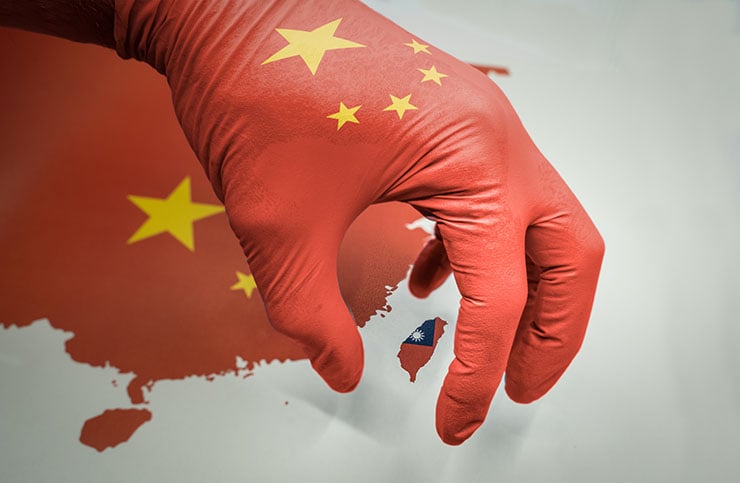“Be prepared for the future and resolutely overcome all uncertainties,” said Chinese President Xi Jinping said of his country’s rivalry with the United States when he took the stage to mark the 75th anniversary of the proclamation of the People’s Republic last week. Calling Taiwan “China’s sacred territory” and its people “connected by blood” to mainland Chinese, he promised to “promote the spiritual harmony of compatriots on both sides of the [Taiwan] strait, and resolutely oppose Taiwan independence separatist activities.”
Beijing regards Taiwan as a rebellious island province that should be reunited with the mainland, which has been under communist rule since 1949. Xi has maintained that this process should be peaceful, but in recent years he has presided over a massive military buildup that includes sophisticated naval forces, amphibious warfare capabilities, and improvements to China’s nuclear forces. He has also pressured the dwindling number of countries that still recognize Taiwan’s independence to withdraw their recognition and at least implicitly recognize Beijing’s sovereignty over the island.
Now, however, Xi’s blood-and-soil pronouncements have become more strident and impassioned. Could China be planning a move on Taiwan in the near future? Only Xi, who has consolidated national power into his own hands with theoretical lifetime rule, knows the answer, but viewing the rest of the world—and particularly American foreign policy as it sputters toward the end of Joe Biden’s term—offers what could be irresistible temptation.
Since Biden entered office in 2021, Beijing has watched American positions deteriorate to its own considerable benefit. Biden’s botched withdrawal from Afghanistan stands as Washington’s greatest international humiliation since the fall of Saigon in 1975. It not only turned over Afghanistan to the Taliban, whom American forces and their weak Afghan allies had been battling at great cost for 20 years, but also opened the country’s vast mineral wealth to exploitation by the Chinese.
Six months later, Beijing watched as Russia resumed its invasion of Ukraine, which Biden did nothing to deter, and which has now degenerated into a long-term stalemate that Biden’s diplomacy can neither end nor resolve. Just days before, Russia and China had entered into an “unlimited alliance” that brought them closer than they’ve been at any time since the early Cold War. Throughout Russia’s invasion, during which China’s exports north have increased by 67 percent, China has been all too happy to corner Russia’s widely sanctioned import market in consumer goods, vital technologies, and weapons, while consuming larger shares of Russian energy exports.
Across Africa, where Chinese investment and influence has consistently grown amid declining American fortunes under Biden’s watch, multiple sub-Saharan governments have been overthrown by military coups. The successor governments have reduced or eliminated the military assets of the U.S. and its allies. China and its Russian ally have happily filled the vacuum. Both have gained impressive strategic and economic concessions while disclaiming such Biden-era priorities as democratization, human rights, and LGBTQ awareness.
In the Middle East, Xi watched while Biden’s diplomats tried in vain to resuscitate Barack Obama’s misguided nuclear deal with Iran—a gambit the Iranians rejected—while empowering Iran through cash transfers intended to encourage regional restraint. Beijing then observed the spectacle of a revived Iran funding Hamas—the Sunni terrorist government in Gaza—as well as Tehran’s traditional Shiite clients in Iraq, Syria, Lebanon, and Yemen, all of which proceeded to attack American, Israeli, and other allied targets. These outrages included the devasting Oct. 7, 2023, which resulted in the killing of more than 1,200 Israeli civilians. While Israel’s military response has decimated Hamas and Hezbollah, the Iran-backed Shiite militia in Lebanon, the Biden administration’s efforts to negotiate a ceasefire have failed. Both Arab and Israeli leaders are now ignoring American priorities and snubbing Biden’s representatives. American military responses to aggression by Iran and its proxies have been unfortunately minimal.
If this global situation favors Chinese aggression against Taiwan, Beijing’s opinion of American might and influence must be particularly low. Biden withdrew from his reelection race in July because of the near-unanimous perception that he was too physically and mentally incapacitated to continue. Nevertheless, he remains in office, betraying signs of further decline as the world around his frequent beach holidays worsens. Earlier last week, he appeared to confuse Houthi militants in Yemen with American dockworkers who were preparing to go on strike.
No matter who wins in November, even the dimmest strategist can figure out that Biden will not improve in his remaining three and a half months as a lame duck president. Nor should any adversary expect his foreign policy and national security teams to improve in their performance and capability in their remaining tenure. As of Jan. 20, 2025, Biden will be replaced either by his anointed successor Kamala Harris, who has suggested she will replace his team with presumably more competent officials, or by Donald J. Trump. This former president’s administration was characterized by deterrence, and he has pledged to rely on military might and strong economic measures to restore American preeminence. In any event, the best time for an American adversary to build a strong position is right now. The only question is whether anyone in Washington is ready to respond.

Leave a Reply